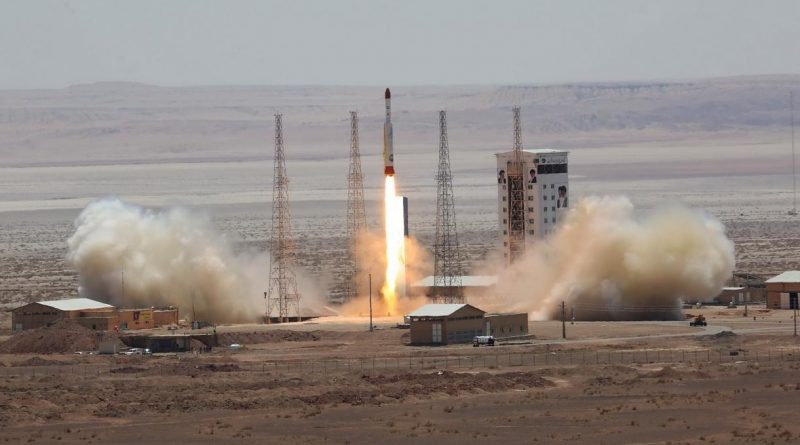Iran’s foreign minister has criticized the United States government for a recent round of sanctions imposed on the country’s space agencies, saying that they will have no effect.
“The Americans are addicted to sanctions. These U.S. sanctions have no effect and the world is also beginning to ridicule the U.S. What remains for them [Americans] is to sanction themselves one day,” Iranian Foreign Minister Mohammad Javad Zarif, who was on an official visit to Bangladesh, said on September 4 according to Tasnim.
On September 3, the U.S. treasury department imposed sanctions on Iran Space Agency, Iran Space Research Center and the Astronautics Research Institute, accusing all three of being tied to Tehran’s ballistic missile program.
“The United States will not allow Iran to use its space launch program as cover to advance its ballistic missile programs,” Secretary of State Mike Pompeo said in a statement.
Pompeo said that the "urgency of the threat" was underscored by Iran's recent attempt to launch a space vehicle, The New York Times reported.
An Iranian rocket exploded on its launch pad at Imam Khomeini Space Center in Semnan, central Iran on August 29 before a scheduled launch. The blast followed failed launches of the Payam and Doosti satellites in January and February. A separate fire at the Imam Khomeini Space Center in February also killed three researchers, authorities said at the time.
The next day, U.S. President Donald Trump posted a high-resolution image of the launchpad after the incident, and wrote in a tweet that the United States was not involved. Iranian officials have ruled out sabotage, saying the explosion did not result in any human or equipment casualty.
A spokesman for the Iranian government, Ali Rabiei, said earlier this week, "No satellite was on the launcher when the explosion took place," adding that the blast occurred during a test.
Rabiei said the blast was the result of an error – the details of which are still not known.
"They wanted to suggest that they were able to carry out sabotage in our institutions, but our experts have dismissed sabotage as the cause of the explosion.”
The United States fears that long-range ballistic technology used to put satellites into orbit may also be used to launch nuclear warheads – a concern not specific to Iran’s missile development programs, but with North Korea as well.
Meanwhile, Tehran denies that the country’s space programs are a cover for developing weapons launch capabilities, despite the technologies for launching intercontinental ballistic missiles and those into space being essentially the same.
The Iran Space Agency develops satellites and launch vehicle technology and works with the Iran Space Research Center on day-to-day tasks as well as research and development. The two have also worked with a sanctioned liquid propellant ballistic missile organization, Shahid Hemmat Industrial Group, the State Department said.
The fear is that the technology used to put a satellite into orbit could also be used to put a nuclear warhead on a ballistic trajectory capable of striking thousands of miles away. The US and Russia have converted many such vehicles from one duty to the other, such as the US’ Titan II intercontinental ballistic missile and Russia’s R-7 series of ICBMs.
Currently, Iran is preparing to launch the communication satellite named Nahid-1 into space.







 President Ilham Aliyev shed light on the evolving contours of the peace process with Armenia during an international conference in Baku this week. ...
President Ilham Aliyev shed light on the evolving contours of the peace process with Armenia during an international conference in Baku this week. ...
 Azerbaijan and Armenia started the process of demarcation of their border on Tuesday, with the installation of the first border markers based on ge...
Azerbaijan and Armenia started the process of demarcation of their border on Tuesday, with the installation of the first border markers based on ge...
 Armenian sappers commenced on Monday mine-clearance operations in the territories adjacent to the Saint Mary Church in village of Voskepar (Armenia...
Armenian sappers commenced on Monday mine-clearance operations in the territories adjacent to the Saint Mary Church in village of Voskepar (Armenia...
 Iran and Pakistan have signed eight cooperation documents in various fields, and agreed to strengthen ties to fight terrorism in the region.
Iran and Pakistan have signed eight cooperation documents in various fields, and agreed to strengthen ties to fight terrorism in the region.
 As the conflict between Ukraine and Russia escalates, the strategic importance of Kharkiv, Ukraine's second-largest city, has come sharply into focus.
As the conflict between Ukraine and Russia escalates, the strategic importance of Kharkiv, Ukraine's second-largest city, has come sharply into focus.
 President Aliyev emphasized the critical role of the North-South Transport Corridor in fostering transport cooperation between Azerbaijan and Russi...
President Aliyev emphasized the critical role of the North-South Transport Corridor in fostering transport cooperation between Azerbaijan and Russi...



